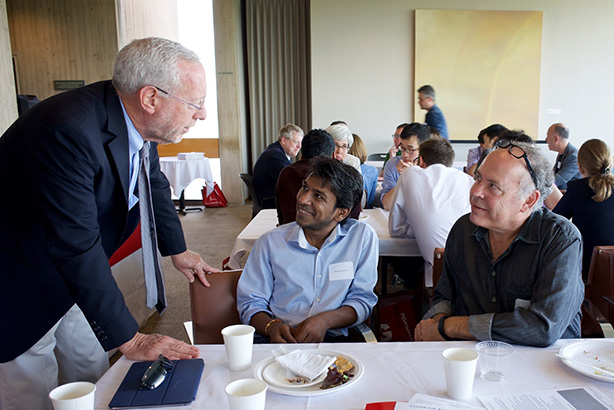COVER STORY
'The faculty is the university.'
– Cornell Provost Michael Kotlikoff

Provost Michael Kotlikoff, left, chats with Rachit Agarwal, assistant professor of computer science, center, and Jon McKenzie, visiting professor of English and the Dean's Fellow for Media and Design in the College of Arts and Sciences, Aug. 18 at the New Faculty Orientation sponsored by the Provost's Office of Faculty Development and Diversity. Photo: Joe Wilensky
It's a simple statement that speaks volumes.
"The faculty do the discovery, they apply those discoveries, and they teach and inspire our students. It's really impossible to overestimate the role of the faculty at Cornell – they really are what is permanent and fundamental about our academic institution," Kotlikoff says.
To keep Cornell's world-class academic departments at the tops of their fields and advance the university's reputation as a top research institution, while also addressing Cornell's challenge to hire a new generation of teachers and researchers, Kotlikoff has launched an ambitious series of initiatives to enhance faculty hiring – with particular attention given to strategic, collaborative discipline areas that point the way toward the discoveries and solutions of tomorrow.
It's a hybrid approach, like so many parts of Cornell: collaborative and balanced, partly centralized and partly given over to the individual colleges to determine their own priorities and objectives. It encourages the growth of self-organized initiatives and needs that have bubbled up naturally from departments and faculty members, while it brings administrative muscle, funding and assistance to cross-college and cross-campus efforts.
The strategic initiatives tout the "radical collaboration" that defines Cornell's research and teaching enterprise in and across seven discipline areas: nanoscale science and molecular engineering; genome biology; data science; sustainability; the social sciences; infection biology; and the humanities and arts. Each initiative involves a research focus of at least eight separate academic departments from a minimum of four colleges, creating more faculty interactions across the Ithaca campus and between Ithaca and Cornell's New York City campuses. They will build strength, bolster recruitment and organize infrastructure.
In addition to the pressing task of bringing in brilliant young researchers and teachers, along with outstanding faculty already making names for themselves in their fields, is the need to retain existing faculty so they aren't hired away to competing institutions.
A good example of the approach is the effort in the field of nanoscience. Its target is making 10 midlevel or senior hires over the next five years in an area that, Kotlikoff says, will have a major impact on a number of departments within several colleges.
"Part of Cornell's advantage in this recruitment effort is the fact that we are such a collaborative environment," Kotlikoff says, noting the focus on nanoscience was initially organized by faculty members themselves. It "is a great example of the collaboration among physics and chemistry in Arts and Sciences, a number of Engineering departments, departments in Human Ecology and the College of Agriculture and Life Sciences, as well as others."
"I like to think about Cornell as a place with no fences, with no barriers to collaboration. And these initiatives will really highlight that," he says.
Another purpose of the initiatives is a built-in boon to recruitment, Kotlikoff notes. "It's to create a sense of forward motion in these areas that attract individuals to join something that is beyond one department. To be recruited as part of a community, by multiple departments, and as a scientist … that's a very seductive and attractive presentation to a potential faculty member."
At the same time, Kotlikoff is mindful to not overemphasize the provost's office role. "The primary responsibility for academic excellence lies within the colleges, and they have to have the ability – the financial ability and the strategy – to enhance their own objectives, many of which may not be multidisciplinary or multicollege," he notes, citing the university's world-class astrophysics department as just one example.
"So by not having an initiative around astrophysics, we're in no way diminishing the importance of that for the university," he says. Cornell will continue to promote and support departments and programs like that and "make sure the colleges have the financial ability to succeed in enhancing their own stature."
Along with the initiatives, Kotlikoff also is working on boosting recruitment of diverse faculty and dual-career hires. He is funding hiring incentives through his office and working with college deans to create an additional recruitment and retention advantage throughout Cornell's campuses.
Cornell's reputation as a world-class research university, along with its spirit of community and collaboration, is the essence of its success. Many recent faculty hires exemplify this spirit. Here is a look at seven members of the faculty, hired in just the past few years, who represent the vitality at the academic heart of Cornell today.
More information: Office of the Provost, provost.cornell.edu Office of the Vice Provost for Research, ovpr.research.cornell.edu